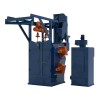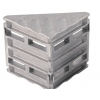The following is designed for general reference only, and is not an exhaustive statement of the law on the topic of import and Export Regulations in Hong Kong.
import and Export Regulations in Hong Kong
Chapter 60 of the laws of Hong Kong provides the statutory basis by which the Hong Kong import/export regime is governed.
These laws and their accompanying regulations are indicative of the HKSAR government's commitment to the operation of a liberal, non-discriminatory and business friendly regime. Basically, the regulation of cross border trade is minimal and an open market policy with limited customs interference is encouraged.
To this end, there is no customs tariff on goods coming to or leaving from Hong Kong although some goods will attract an excise duty or require an import/export licence.
It should also be noted that most importers and exporters are required to make an import/export declaration with the Commissioner of Customs within 14 days of the importation or exportation of their goods and that there will be a processing charge with this declaration.
What is an Excise Duty?
Simply put, an excise duty is an internal tax imposed on the production, sale, or consumption of a commodity or the use of a service within a country. In Hong Kong, only four types of goods are subject to excise duties. They are: tobacco products, hydrocarbon oil, alcoholic beverages, and various other alcohol based products. The excise duty on these goods is applicable whether they are imported or produced locally. Excise duties are collected by the Hong Kong Customs and Excise Department. The rates are prescribed in the Schedule to the Dutiable Commodities Ordinance (Chapter 109 of the Laws of Hong Kong). Generally, the rates of excise duty will vary for tobacco, hydrocarbon oil, and the various other alcohol based products depending on the amount of the goods imported or produced. With alcoholic beverages, there are three categories of rates, which vary according a product's alcoholic strength.
What are Licensing Controls?
Not all goods can move absolutely freely into and out of Hong Kong. For example, under the World Trade Organization Agreement on Textiles and Clothing (ATC), exports of certain clothing products and textiles to the USA and Canada, and the EU, originating in Hong Kong, are subject to quota restraint.
In order for the HKSAR to fulfill its international obligations, and to maintain its own standards of health, safety and security, Certificates of Origin and import and export licences (quotas) are required with respect to the movement of some goods. Special permits will also likely be required when goods are considered dangerous. According to the Custom and Excise Department, the following goods will be subject to import and export licensing controls: Dangerous drugs, pharmaceutical products, medicine, arms and ammunition, irradiating apparatus, radioactive substances, radio transmitting equipment, pesticides, endangered species, animals and plants, ozone depleting substances, textiles and certain foodstuffs. The Custom and Excise Department uses the broad label of "prohibited goods" to classify these goods. Despite the use of the word 'prohibited', it is still possible to move these goods into and out of Hong Kong, although any person who wishes to do so must first obtain all the required licences, permits, and certificates.
Not all goods that appear at first glance to be prohibited will fall into a prohibited classification. For example, textiles imported by air as fabric swatches (less than 0.8 m2) and sample yarns (less than 1.2 kg) generally do not (at the time of writing) require licensing in order to be moved. Similarly, pharmaceutical products and textiles designated for an importer's personal use do not need to be licensed. A detailed guide to the various licensing requirements for prohibited goods in Hong Kong is provided by the Trade and Industry Department. The requirements are subject to change from time to time and so the guide should be consulted often.
Other government departments may have their own licensing requirements apart from those of the Trade and Industry Department and an importer or exporter should be aware of these as well. Licensing application forms are available from the Government Publications Centre or the Trade and Industry Department for a price. Certain forms can be submitted through Electronic Data Interchange (EDI) service provided by Tradelink Electronic Commerce Limited (Tradelink). There will be a processing fee.
How can I secure a Certificate of Hong Kong Origin?
If you need a CHKO issued by the Director-General of Trade and Industry to prove that the goods you want to export originate from Hong Kong, you have to make sure that the manufacturer of the goods concerned has registered with the Trade and Industry Department for certification of origin purposes. If the manufacturer has registered with the Department, they will issue you a CHKO on request. Besides the Trade and Industry Department, you can submit your application for a CHKO to one of five Government Approved Certification Organizations (GACOs). These are: The Hong Kong General Chamber of Commerce, The Chinese Manufacturers' Association of Hong Kong, The Federation of Hong Kong Industries, The Indian Chamber of Commerce, and The Chinese General Chamber of Commerce.
What is the Required import/Export Declaration?
Under the import and Export (Registration) Regulations, every person who imports or exports any article other than an exempted article into or out of Hong Kong is required to lodge with the Commissioner of Customs and Excise an accurate and complete import/export declaration within 14 days after the importation/exportation of the article. This declaration describes the quantity and quality of the goods in question and provides the Commissioner with information as to what is being imported into and exported from Hong Kong. A declaration can typically be made on the prescribed form or through the Electronic Data Interchange Service mentioned above. At the time of lodging, a processing charge will typically be levied against the goods. This charge will vary with the amount and type of declared goods. Lodging a declaration is considered very important by the Customs and Excise Department. Failure to lodge the required declaration, or knowingly or recklessly lodging an inaccurate declaration, may result in an action against the importer/exporter responsible.






